Explanation of the role of a kidney specialist (nephrologist).
- Diagnosis and Treatment of Kidney Diseases: Nephrologists diagnose and treat various kidney diseases, including acute kidney injury, chronic kidney disease, glomerulonephritis, and polycystic kidney disease.
- Management of Chronic Conditions: They manage chronic conditions that affect the kidneys, such as diabetes and hypertension, to prevent kidney damage.
- Dialysis: Nephrologists oversee dialysis treatment for patients with advanced kidney failure. This includes both hemodialysis and peritoneal dialysis.
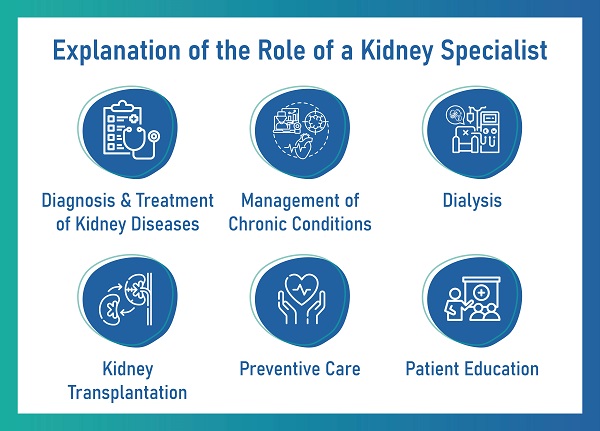
- Kidney Transplantation: They work with transplant teams to manage patients before and after kidney transplants, ensuring the best possible outcomes.
- Preventive Care: Nephrologists provide education on lifestyle changes and medications to prevent the progression of kidney disease.
- Patient Education: They educate patients about their conditions and the importance of adhering to treatment plans, including dietary and lifestyle modifications.
One notable nephrologist in the city is Dr. Vijay Patel. Dr. Patel is highly regarded for his expertise in nephrology and has made significant contributions to the field. He is known for his compassionate patient care and comprehensive approach to treating kidney diseases.
- Experience and Expertise: Dr. Vijay Patel has extensive experience in diagnosing and managing various kidney conditions. His expertise includes handling complex cases of chronic kidney disease, kidney transplants, and dialysis.
- Patient-Centered Approach: Dr. Patel is known for his patient-centered approach, ensuring that each patient receives personalized care tailored to their specific needs.
- Advanced Treatments: He stays updated with the latest advancements in nephrology to provide his patients with the best possible treatment options.
- Reputation: Dr. Patel is well-regarded in the medical community in Mumbai for his dedication and proficiency in nephrology.
Differences between Nephrologists and Urologists:
Nephrologists:
- Focus: Nephrologists primarily deal with the medical aspects of kidney care. They diagnose and manage kidney diseases, including chronic kidney disease (CKD), acute kidney injury, and glomerular diseases. They also handle issues related to electrolyte imbalances, hypertension, and dialysis.
- Treatments: Nephrologists provide treatments such as medication management, dialysis, and recommendations for lifestyle changes. They may also manage patients pre- and post-kidney transplant.
- Education and Training: Nephrologists complete an internal medicine residency followed by a fellowship in nephrology.
Urologists:
- Focus: Urologists specialize in the surgical and medical treatment of the urinary tract system, which includes the kidneys, bladder, ureters, and urethra, as well as the male reproductive system. They handle conditions such as kidney stones, urinary tract infections (UTIs), bladder and prostate cancer, and male infertility.
- Treatments: Urologists perform surgeries (like removing kidney stones, repairing the urinary tract, and treating cancers), provide medications, and use other medical interventions.
- Education and Training: Urologists complete a surgical residency in urology.
How to Find the Best Kidney Specialist in Mumbai:
- Qualifications and Specialization: Look for specialists who are board-certified in nephrology, indicating they have completed rigorous training and examinations in kidney care.
- Experience: Check how long the specialist has been practicing nephrology and if they have experience treating conditions similar to yours.
- Patient Reviews and Recommendations: Read patient reviews and testimonials to gauge the doctor's bedside manner, communication skills, and overall patient satisfaction.
- Accessibility and Convenience: Consider the location of the specialist's clinic or hospital, as well as appointment availability.
- Insurance Coverage: Check if the specialist accepts your health insurance plan to minimize out-of-pocket costs.
Top Kidney Specialists in Mumbai:
Dr. Vijay Patel:
- Profile: Dr. Vijay Patel is a highly respected nephrologist based in Mumbai, known for his expertise in kidney transplantation and managing complex kidney diseases.
- Achievements: He has a strong academic background and extensive experience in nephrology, with a focus on both adult and pediatric nephrology cases.
- Areas of Expertise: Kidney transplantation, chronic kidney disease management, dialysis, pediatric nephrology.
Comprehensive Kidney Care Services in Mumbai:
Chronic Kidney Disease (CKD) Management:
Hemodialysis and Peritoneal Dialysis:
Kidney Transplant Evaluation and Care:
Management of Other Kidney Disorders:
Advanced Treatments Offered by Kidney Specialists in Mumbai:
In Mumbai, kidney specialists like Dr. Vijay Patel may offer a range of advanced treatments for various kidney conditions.
- Kidney Transplantation: This remains a critical treatment for end-stage kidney disease where a healthy kidney from a donor is transplanted into a patient.
- Minimally Invasive Surgery: Techniques such as laparoscopic nephrectomy for kidney removal or nephrolithotomy for kidney stone removal minimize recovery times and reduce complications.
- Advanced Dialysis Options: Including home dialysis modalities like peritoneal dialysis (PD) or home hemodialysis (HHD), which offer flexibility and improved quality of life for patients.
- Immunosuppressive Therapies: Essential for post-transplant care, these medications help prevent organ rejection.
- Biological Therapies: Such as monoclonal antibodies or immunomodulatory drugs, which are increasingly used to treat certain autoimmune kidney diseases.
- Precision Medicine Approaches: Utilizing genetic testing and biomarkers to tailor treatments to individual patients, improving efficacy and minimizing side effects.
- Regenerative Medicine: Investigational approaches aiming to repair or regenerate damaged kidney tissues.
Patient Care: What to Expect from a Kidney Specialist in Mumbai:
- Diagnosis: Initially, the specialist will conduct a thorough evaluation which may include reviewing your medical history, conducting physical examinations, and ordering specific tests such as blood tests, urine tests, imaging studies (like ultrasound or CT scans), and sometimes kidney biopsy if needed. This helps in accurately diagnosing the condition and understanding its severity.
- Personalized Treatment Plan: Based on the diagnosis, Dr. Vijay Patel will develop a personalized treatment plan tailored to your specific condition, considering factors like the stage of kidney disease, underlying causes, and your overall health. This plan may include medical management, lifestyle changes, and in some cases, referral to other specialists for integrated care.
- Education and Counseling: Understanding kidney disease and its management is crucial. A good kidney specialist will ensure that you and your family receive comprehensive education about your condition, treatment options, dietary modifications, and lifestyle changes necessary to manage and potentially slow the progression of kidney disease.
- Regular Monitoring: Kidney diseases often require ongoing monitoring to track the progression of the condition and assess the effectiveness of treatment. This may involve regular check-ups, lab tests (like monitoring kidney function through serum creatinine and eGFR), and adjustments to the treatment plan as needed.
- Coordination of Care: If your condition requires additional specialized care, such as dialysis or kidney transplantation, Dr. Vijay Patel will coordinate with other healthcare providers to ensure seamless and integrated care.
- Support and Follow-Up: Throughout your treatment journey, a kidney specialist like Dr. Vijay Patel will provide continuous support, addressing any concerns you may have and ensuring that you are well-informed and empowered to manage your kidney health effectively.
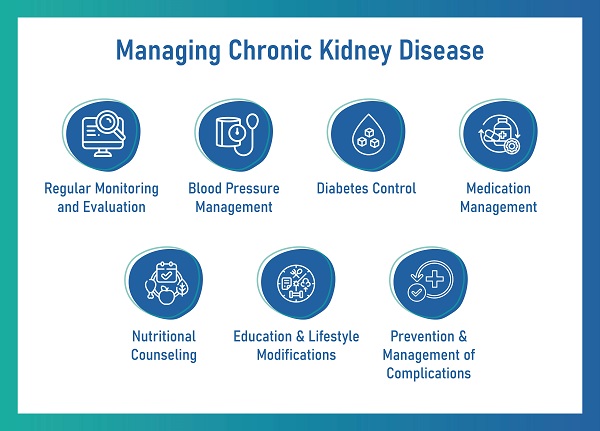
Managing Chronic Kidney Disease with a Specialist in Mumbai:
- Regular Monitoring and Evaluation: A kidney specialist plays a crucial role in ongoing monitoring of kidney function through regular check-ups, blood tests (e.g., serum creatinine, electrolytes), urine tests, and imaging studies (like ultrasound or CT scans). This helps in assessing the progression of CKD and adjusting treatment plans accordingly.
- Blood Pressure Management: Controlling blood pressure is vital in managing CKD as it helps in slowing down the progression of kidney damage. Specialists like Dr. Vijay Patel often prescribe medications and recommend lifestyle changes to maintain optimal blood pressure levels.
- Diabetes Control: If diabetes is a contributing factor to CKD, managing blood sugar levels is essential. A kidney specialist can collaborate with endocrinologists or diabetologists to ensure comprehensive management.
- Medication Management: Specialists tailor medication plans to manage symptoms, complications, and underlying causes of CKD. This may include medications to manage blood pressure, reduce proteinuria (excess protein in urine), and treat other related conditions.
- Nutritional Counseling: Diet plays a crucial role in managing CKD. A kidney specialist, often supported by dietitians, provides personalized dietary recommendations to manage electrolyte levels, reduce protein intake as necessary, and control other aspects of nutrition that impact kidney function.
- Education and Lifestyle Modifications: Specialists educate patients about CKD, its progression, and the importance of lifestyle modifications such as quitting smoking, maintaining a healthy weight, and regular physical activity to preserve kidney function.
- Prevention and Management of Complications: CKD can lead to complications such as anemia, bone disease, and cardiovascular issues. Specialists initiate preventive measures and treatments to address these complications early on.
Preventive measures for kidney health:
- Stay Hydrated: Drink plenty of water throughout the day to help flush out toxins and prevent dehydration, which can strain the kidneys.
- Balanced Diet: Eat a healthy, balanced diet that is low in sodium, processed foods, and sugars. Include fresh fruits, vegetables, whole grains, and lean proteins.
- Control Blood Pressure: Keep your blood pressure under control through diet, exercise, and medication if prescribed. High blood pressure can damage the kidneys over time.
- Monitor Blood Glucose Levels: If you have diabetes, monitor your blood sugar levels closely. High blood sugar levels can damage the kidneys.
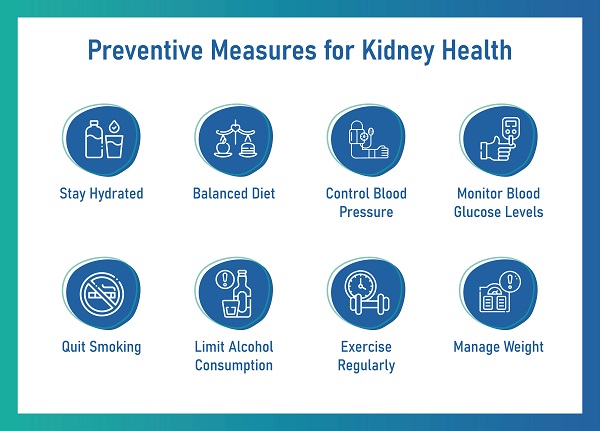
- Quit Smoking: Smoking can impair kidney function and worsen existing kidney disease.
- Limit Alcohol Consumption: Excessive alcohol intake can harm the kidneys. Drink alcohol in moderation, if at all.
- Exercise Regularly: Stay physically active to maintain a healthy weight and improve overall health, which supports kidney function.
- Manage Weight: Obesity and being overweight can increase the risk of kidney disease. Maintain a healthy weight through diet and exercise.
- Avoid Overuse of Painkillers: Over-the-counter pain medications like NSAIDs (e.g., ibuprofen, aspirin) can harm the kidneys if used excessively. Consult your doctor about safer alternatives.
- Regular Check-ups with a Kidney Specialist: Schedule regular check-ups with a kidney specialist, such as Dr. Vijay Patel in Mumbai, especially if you have a family history of kidney disease or other risk factors. These check-ups can help detect any kidney problems early and monitor your kidney health effectively.
Diet and Nutrition Advice from Kidney Specialists:
Foods to Include:
- Low-Potassium Fruits and Vegetables: Examples include apples, berries, cauliflower, and cucumbers.
- Low-Phosphorus Foods: Foods like rice, pasta, and breads made from refined grains.
- Lean Proteins: Chicken, fish, and eggs are good choices. Plant-based proteins like tofu and legumes can also be included.
- Healthy Fats: Avocados, nuts, and olive oil are beneficial.
- Limited Dairy: Opt for lower phosphorus options like yogurt or milk substitutes.
Foods to Limit or Avoid:
- High-Potassium Foods: Bananas, oranges, potatoes, and tomatoes.
- High-Phosphorus Foods: Dairy products, whole grains, and processed foods
- Sodium: Reduce intake of salt, processed meats, and canned foods
- Sugary Foods and Beverages: Limit sweets and sugary drinks to manage blood sugar and weight.
- Alcohol: Moderation is key, as excessive alcohol can strain the kidneys.
General Tips:
- Portion Control: Manage portion sizes to avoid overloading the kidneys.
- Hydration: Stay adequately hydrated with water unless restricted by your doctor.
- Consultation: Always consult with a kidney specialist like Dr. Vijay Patel for personalized advice based on your specific condition and health needs.
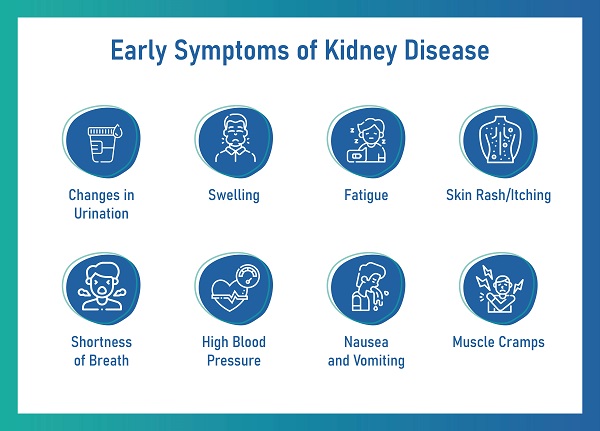
Recognizing Early Symptoms of Kidney Disease:
- Changes in Urination: Such as increased or decreased frequency, foamy urine, or blood in the urine.
- Swelling: Particularly in the feet, ankles, hands, or face due to fluid retention.
- Fatigue: Feeling unusually tired, weak, or having difficulty concentrating.
- Skin Rash/Itching: Persistent itching or dry skin can be a sign of waste buildup in the blood.
- Shortness of Breath: Difficulty breathing, especially when lying down due to fluid buildup in the lungs.
- High Blood Pressure: Often a cause and consequence of kidney disease.
Screening and Early Detection Programs in Mumbai:
- Importance of Early Detection: Early detection of kidney diseases can help in managing conditions like chronic kidney disease (CKD), kidney stones, urinary tract infections (UTIs), and other renal disorders before they progress to more severe stages. This early intervention can potentially slow down disease progression and reduce complications.
- Screening Programs: Hospitals and Clinics: Many hospitals and specialized clinics in Mumbai offer comprehensive health check-up packages that include kidney function tests such as serum creatinine, blood urea nitrogen (BUN), and urine analysis. These tests help in assessing kidney health and detecting abnormalities early.
- Role of Kidney Specialists like Dr. Vijay Patel: Kidney specialists such as Dr. Vijay Patel play a crucial role in these programs by providing expertise in interpreting test results, diagnosing kidney diseases accurately, and recommending appropriate treatment plans. They also educate patients about kidney health, risk factors for kidney diseases, and the importance of regular screenings. This proactive approach helps in preventing kidney diseases or managing them effectively if diagnosed early.
- Access to Treatment: Early detection not only improves treatment outcomes but also allows patients to access a range of treatment options, including medications, dietary changes, and in some cases, specialized interventions like dialysis or kidney transplantation.
Latest Research and Innovations in Nephrology:
- Precision Medicine: Advances in genetic testing and personalized medicine have enabled nephrologists to tailor treatments based on an individual's genetic profile and disease characteristics. This approach helps in predicting responses to medications and identifying risks earlier.
- Telemedicine and Remote Monitoring: Especially relevant in a city like Mumbai, telemedicine has become integral, allowing patients to consult with nephrologists remotely. Remote monitoring technologies help in tracking vital signs, medication adherence, and disease progression, facilitating timely interventions.
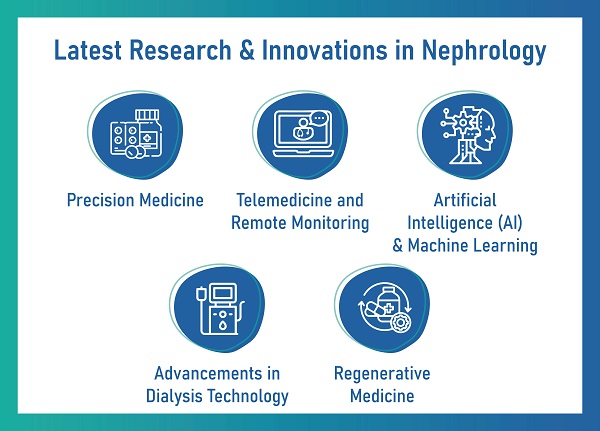
- Artificial Intelligence (AI) and Machine Learning: AI applications are being used to analyze vast amounts of data from patient records, imaging studies, and genetic information to identify patterns and predict outcomes. This helps in early detection of kidney disease progression and optimizing treatment strategies.
- Advancements in Dialysis Technology: Innovations in dialysis machines and techniques, such as portable dialysis devices and improved filtration membranes, enhance the efficiency and comfort of dialysis treatments. This is crucial for patients requiring frequent dialysis sessions.
- Regenerative Medicine: Research into stem cell therapies and tissue engineering holds promise for repairing damaged kidney tissue and even potentially creating bioengineered kidneys in the future. While still in experimental stages, these approaches offer hope for more permanent solutions